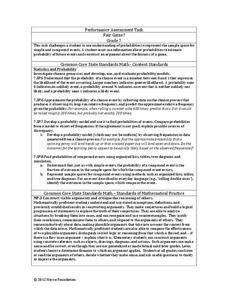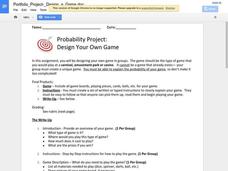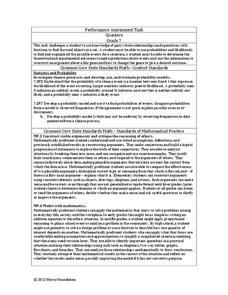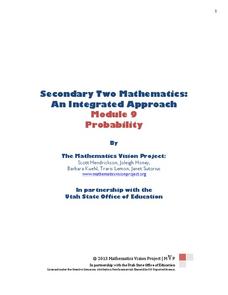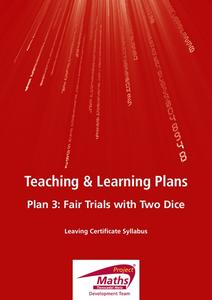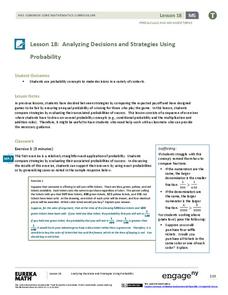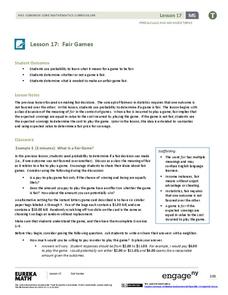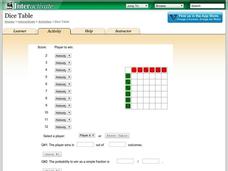Intel
Fair Games
Who said things were fair? The unit introduces probability and its connection to fairness. The class interacts with activities of chance and plays games to relate them to fairness. Groups design a fair game and develop a presentation....
EngageNY
Fair Games
What constitutes a fair game? Scholars learn about fair games and analyze some to see if they are fair. They extend this idea to warranties and other contexts.
Noyce Foundation
Fair Game?
The game should be fair at all costs. The mini-assessment revolves around the ability to use probabilities to determine whether a game is fair. Individuals determine compound events to calculate simple probabilities and make long-run...
Google
Probability Project: Design Your Own Game
Designing a game is the focus of this probability lesson. Groups develop and build a unique game, including directions for how to play, a calculation of the expected value of winning, and a personal reflection. The plan provides a rubric...
National Security Agency
Are You Game? A Lesson Connecting Fractions and Probability
Exactly how fair are the board games children grow up playing? Young mathematicians investigate this questions as they work their way through this five-lesson series on basic probability.
Curated OER
Mathematics of Fair Games
Learners examine mathematicians' notion of fairness in games of chance. They work in pairs to perform three different experiments using macaroni and paper bags. They record their results on charts and compare their data.
Noyce Foundation
Counters
For some, probability is a losing proposition. The assessment item requires an understanding of fraction operations, probability, and fair games. Pupils determine the fractional portions of an event. They continue to determine whether...
Curated OER
Probability Games and Activities, Unit 10
Looking for tangible ways to practice probability with your class? Through 4 activities, students practice with experimental probability, using math to make educated guesses, then testing it through physically completing the experiment....
Mathematics Vision Project
Probability
Probability, especially conditional probability, can be a slippery concept for young statisticians. Statements that seem self-evident on the surface often require a daunting amount of calculations to explicate, or turn out to be not so...
Curated OER
Fair Games
Young scholars participate in several chance activities and examine a few games for fairness. They become game designers who are asked to design a fair game for a toy company. Students must describe the rules for play and examine...
Curated OER
Charity Fair
What is the probability of picking the same color ball out of three identical barrels? If you wanted to design a game that made money, how could you structure a game and what would you charge for each chance? How much should you pay a...
Curated OER
Probability: Grade A
Math whizzes explore dependent and independent outcomes. They determine the outcome of simple and compound events. Pupils complete tree diagrams to identify outcomes. They identify fair and unfair games. This two-page worksheet contains...
Project Maths
Fair Trials with Two Dice
Life's not fair, but dice games should be. After playing a two-person game with a pair of dice, scholars investigate the fairness of the game. They consider the number of possible outcomes using the fundamental counting principle and...
Curated OER
The Fair Factor
Students participate in playing many games to determine if they are fair or not. They create their own game that is fair to play with their classmates.
Curated OER
Probability: The Study of Chance
Young scholars conduct an experiment, determine if a game is fair, and collect data. They interpret data, then display line graph. They conduct analysis of game for probability.
EngageNY
Analyzing Decisions and Strategies Using Probability 1
Learn how to increase the probability of success. The 19th installment of a 21-part module teaches future mathematicians how to use probability to analyze decisions. They determine strategies to maximize the chances of a desired outcome.
Curated OER
Pick A Number
Elementary schoolers find out which month has the most class birthdays (mode) and which birthday represents the middle point of all the birthdays (median). They gather and organize data to find one number that fairly represents the whole...
EngageNY
The Difference Between Theoretical Probabilities and Estimated Probabilities
Flip a coin to determine whether the probability of heads is one-half. Pupils use simulated data to find the experimental probability of flipping a coin. Participants compare the long run relative frequency with the known theoretical...
Curated OER
Fair Games
Fifth graders examine the statistics of playing games. Many games of chance and activities in maths text books involve rolling two dice and combining the scores, usually by addition. Students often find the probabilities of such events...
Curated OER
Probability & Game Theory
Young scholars explore the concept of probability. In this probability lesson, students perform various probability experiments including flipping a coin, picking m&m's out of a bag, and the birthday problem.
Curated OER
Probability
Second graders experiment with probability. In this probability lesson plan, 2nd graders pick colored beans from a bag to find the chance of getting different colors. They make fair and unfair spinners and record the data after spinning...
Shodor Education Foundation
Dice Table
Convert a table to probabilities. Pupils set up the winning rules for the sums of two dice. Using the rules, the applet fills out a table showing the winners for each combination. Learners determine the probabilities of winning for each...
CK-12 Foundation
Discrete Random Variables: Roll the Dice!
And the winner is ... not always who it appears to be. An interactive gives the directions for a dice game that on the surface gives one player an advantage over the other. Pupils look closer at the possible outcomes and find the...
National Council of Teachers of Mathematics
Is It Fair?
In this probability instructional activity, learners answer nine questions about the fairness of games. Students determine if a game is fair or not. They list outcomes and find ones' chances of winning.




